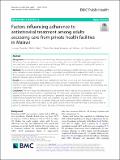| dc.contributor.author | Chiramb, Lusungu | |
| dc.contributor.author | Valet, Martha | |
| dc.contributor.author | Kamanga, Tifiness Mary Banda | |
| dc.contributor.author | Nyondo-Mipando, Alinane Linda | |
| dc.date.accessioned | 2022-01-31T21:18:20Z | |
| dc.date.available | 2022-01-31T21:18:20Z | |
| dc.date.issued | 2019 | |
| dc.identifier.citation | Chirambo, L., Valeta, M., Banda Kamanga, T.M. et al. Factors influencing adherence to antiretroviral treatment among adults accessing care from private health facilities in Malawi. BMC Public Health 19, 1382 (2019). https://doi.org/10.1186/s12889-019-7768-z | en_US |
| dc.identifier.other | Doi.org/10.1186/s12889-019-7768-z | |
| dc.identifier.uri | https://repository.amref.ac.ke/handle/123456789/554 | |
| dc.description | © The Author(s). 2019 Open Access This article is distributed under the terms of the Creative Commons Attribution 4.0
International License (http://creativecommons.org/licenses/by/4.0/), which permits unrestricted use, distribution, and
reproduction in any medium, provided you give appropriate credit to the original author(s) and the source, provide a link to
the Creative Commons license, and indicate if changes were made. The Creative Commons Public Domain Dedication waiver
(http://creativecommons.org/publicdomain/zero/1.0/) applies to the data made available in this article, unless otherwise stated. | en_US |
| dc.description.abstract | Background: Private health facilities are increasingly being recognized as the neglected partner in the provision of
HIV services. The non-adherence rate in the study sites ranged from 19 to 22%. This study explored the factors
associated with non-adherence from antiretroviral therapy (ART) among adult patients accessing ART services at
two privately owned urban health facilities in Malawi.
Methods: We conducted a descriptive qualitative approach employing in-depth interviews among adults who
either defaulted or were retained in HIV care in two privately owned facilities in Malawi from March to July 2017.
We purposively selected participants and interviewed a total of 6 ART providers and 24 ART clients. Data were
analyzed manually using a thematic approach.
Results: Overall, participants identified four facilitators for retention in care and four broad categories of barriers
namely individual, psychological, drug related and human resource related factors. The factors that facilitated
retention in care included follow up visits after missing a visit, adequate information education and counseling, and
supportive relationships.
Conclusion: The main reason for defaulting from antiretrovirals (ARVs) was fear of disclosing an HIV status to avert
potential stigma and discrimination. In implementing ART clinics due consideration and strategies need to be
adopted to ensure that privacy and confidentiality is preserved. Although adoption of all the key Malawi
Implementing strategies like expert clients and a guardian may optimize retention in care, there is need for prior
analysis of how those may lead to unintended disclosure which inadvertently affects adherence. Furthermore,
private facilities should orient their clients to the public facilities within the catchment area so that clients have an
option for alternative access to HIV care in the event of financial constraints. | en_US |
| dc.language.iso | en | en_US |
| dc.publisher | BMC Public Health | en_US |
| dc.subject | Non-adherence | en_US |
| dc.subject | Antiretroviral therapy (ART) | en_US |
| dc.subject | HIV care | en_US |
| dc.subject | Information education and counseling | en_US |
| dc.subject | HIV | en_US |
| dc.title | Factors Influencing Adherence to Antiretroviral Treatment among Adults Accessing Care from Private Health Facilities in Malawi | en_US |
| dc.type | Article, Journal | en_US |

